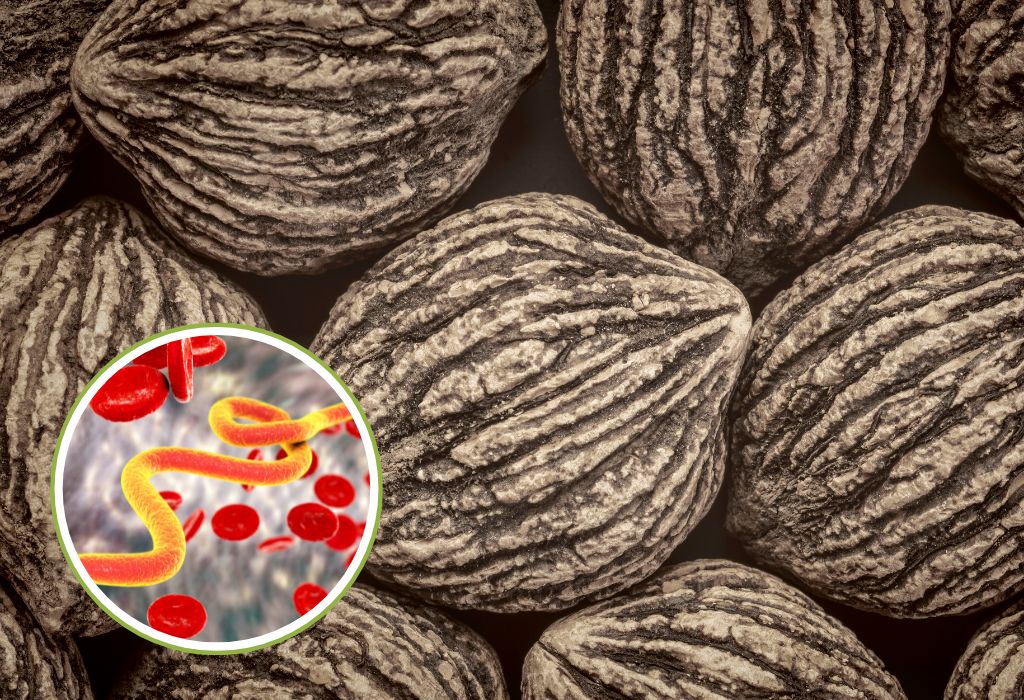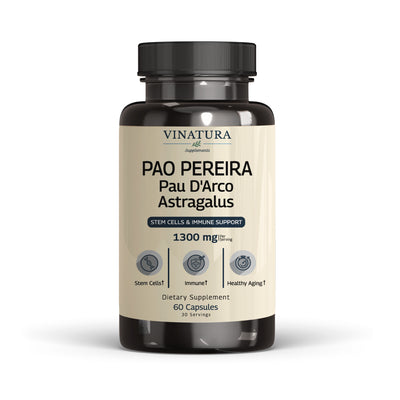
Does Black Walnut Kill Parasites?
Black Walnuts have been used traditionally as a folk remedy to address various health issues. The primary benefits often mentioned include supporting digestive health, antifungal properties, and, most notably, its ability to combat parasites.
However, the true effectiveness of Black Walnuts in this regard remains to be explored in this article!
Before exploring further, please read the disclaimer located at the end of this webpage.
Key Takeaways
- Black Walnut is known for its potential to kill parasites, making it a popular natural remedy in traditional medicine.
- Besides antiparasitic properties, Black Walnut also offers antifungal benefits, digestive support, and antioxidant effects.
- Many people use Black Walnut as a natural laxative to aid in cleansing and promoting a healthy digestive system.
What Is Black Walnut?

Black Walnut (Juglans nigra) or Eastern Black Walnut is a deciduous tree native to North America, valued for its health-promoting properties.
The hull of Black Walnut is especially nutrient-rich, containing compounds such as Juglone, tannins, and polyphenols. [1] The kernel of Black Walnut is also very nutritious, with 60% polyunsaturated fats, rich in B vitamins, B6, vitamin E, and riboflavin.
With these components, Black Walnut is thought to offer many health benefits. Traditionally, Black Walnuts have been used to support digestive health, combat fungal infections, and maintain radiant, healthy skin.
Does Black Walnut Kill Parasites?
In fact, the claims and assertions about Black Walnut’s antiparasitic potential are substantiated, primarily derived from its historical usage in traditional medicine.
From the perspective of modern science and medicine, there are explanations for Black Walnut’s ability to kill parasites.
Black Walnut hulls and leaves contain two key components: Juglone and tannins, which have water-absorbing and astringent properties [2] that can help disrupt the protective coating of parasites when they enter the body.
Moreover, Juglone in Black Walnut has strong antibacterial properties [3], helping balance the body’s internal environment and supporting white blood cells, indirectly aiding the body’s ability to combat parasites.
Black Walnut Benefits
Anti-Parasitic
Based on the above scientific basis, Black Walnut shows significant potential in combating parasites. By disrupting the life cycle of parasites, it helps remove them from the body or at least reduces their persistence in the digestive tract!
Anti-Fungal
Because Black Walnut is rich in Juglone, it also has potent antifungal properties. Studies indicate that: “Juglone in these nuts is of great importance for health. This substance has antifungal, antiparasitic, and antibacterial effects… Juglone exhibits broad antibacterial activity, effective against both gram-positive microorganisms (Staphylococcus aureus, Streptococcus mutans) and gram-negative microorganisms (Escherichia coli, Pseudomonas aeruginosa), as well as pathogenic yeasts (Candida albicans).” [4]
Digestive Health
Nutritionally, Black Walnut is an excellent source of vitamins (folic acid, vitamin B5, vitamin B6, tocopherol), minerals (phosphorus, manganese, magnesium, zinc, potassium), omega-3 fatty acids, and phytochemicals. [5]
Additionally, evidence suggests that Black Walnut kernels are highly effective in inhibiting the growth of gut bacteria and may improve conditions such as colic, dysbiosis, etc. [6]

Excessive Sweating
As mentioned above, tannins and Juglone have water-absorbing and astringent properties, which can help reduce sweating and regulate skin secretions more effectively. In fact, there have been some experiments using walnuts in ointment form to regulate hand and foot sweat. [7]
Using Black Walnut For Parasites
Traditional Use
Traditionally, black walnut, including its shells, leaves, and pulp, has been widely used in medicinal tinctures and powders to support the body's efforts in eliminating parasites.
Herbalists often paired black walnut with other antiparasitic herbs like wormwood and clove to develop remedies with improved effectiveness, as these herbs also possess antiparasitic qualities.
Typical Use
Today, Black Walnut are readily available in capsule and powdered forms, mainly supplied by dietary supplement manufacturers. Additionally, some people incorporate Black Walnut directly into their diet, though it has a less pleasant taste than common walnuts.
Black Walnut Dosage
First, you need to know that the appropriate dosage of Black Walnut varies depending on the purpose of use. However, the dosages provided here are derived from surveys conducted by common Black Walnut suppliers, partly because studies on Black Walnut dosage in humans are quite limited.
For addressing parasites, the recommended dosage typically ranges from 250 mg to 500 mg per day, with gradual increases over time. Most capsules contain the appropriate amount of black walnut to assist in removing parasites from the body.
Black Walnut Side Effects And Interactions
However, it’s worth noting that although walnut are relatively safe, excessive consumption over a short period can lead to digestive reactions, primarily gastrointestinal discomfort, bloating, indigestion, nausea, etc.
Additionally, ensure you are not allergic to walnuts in general, meaning you would also be allergic to Black Walnut. Attempting to use Black Walnut when you are allergic could lead to severe consequences. Therefore, it is advisable to consult a healthcare professional to ensure safety.
Conclusion
In summary, Black Walnut has a long history in traditional medicine as a natural remedy for parasites, fungi, and digestive health. Although scientific studies are still limited and further development is required, its active compounds show potential in aiding the body’s fight against parasitic infections.
If you are considering using Black Walnut for its antiparasitic benefits, consult a healthcare professional for dosage and potential side effects to ensure safety!
References
- [1] LegCharacteristics of Leguminous Nuts and Seeds. https://f.ucr.edu/~legneref/botany/leg.htm.
- [2] Sharma M, Sharma M, Sharma M. A comprehensive review on ethnobotanical, medicinal and nutritional potential of walnut (Juglans regia L.). Proc.Indian Natl. Sci. Acad. 2022;88(4):601–16. doi: 10.1007/s43538-022-00119-9. Epub 2022 Sep 22. PMCID: PMC9510174.
- [3] Ho KV, Lei Z, Sumner LW, Coggeshall MV, Hsieh HY, Stewart GC, Lin CH. Identifying Antibacterial Compounds in Black Walnuts (Juglans nigra) Using a Metabolomics Approach. Metabolites. 2018 Sep 29;8(4):58. doi: 10.3390/metabo8040058. PMID: 30274312; PMCID: PMC6316014.
- [4] “Current Aspects of the Medical Application of Walnut (Juglans Regia L.) and Black Walnut (Juglans Nigra L.) (Review).” Zenodo, July 2024, https://doi.org/10.5281/zenodo.10257429.
- [5] USDA, U.S. Department of Agriculture Nutrient Data Base, http://ndb.nal.usda.gov/ndb/search, accessed May 20, 2019
- [6] A. R. Hutchens, A Handbook of Native American Herbs: The Pocket Guide to 125 Medicinal Plants and Their Uses, Shambhala Publications, 1992
- [7] Almonte-Flores, D. C., Paniagua-Castro, N., Escalona-Cardoso, G., & Rosales-Castro, M. (2015). Pharmacological and Genotoxic Properties of Polyphenolic Extracts ofCedrela odorataL. andJuglans regiaL. Barks in Rodents. Evidence-Based Complementary and Alternative Medicine, 2015, 1-8. doi:10.1155/2015/187346
Author

Product Disclaimer
Including an ingredient or study does not evaluate, endorse, or recommend any Vinatura product or any third-party product. Some ingredients discussed may not be used in any Vinatura product.
The content of the articles has not been evaluated by the Food and Drug Administration (FDA) and is not intended to promote or endorse any specific product. Any products sold on this website are not intended to diagnose, treat, cure, or prevent any disease.
Opinions and Endorsements
Any claims, statements, or opinions expressed in the articles are those of the author(s) and do not necessarily reflect the views or opinions of the manufacturers of the dietary supplement products. The products sold on this website are separate from the content of the articles and are not directly endorsed or associated with the information presented here.
Liability Disclaimer
The author(s) of the articles, website, and manufacturers of the dietary supplement products do not assume any liability for any potential consequences arising from the use of the information provided in the articles. Ingredient effects, dosages, and safety vary by individual, formulation, and context; some ingredients interact with medications or may be unsuitable during pregnancy or lactation. It is recommended that individuals consult with a qualified healthcare professional before making any dietary or lifestyle changes, including the use of dietary supplements.
Product Usage
Please refer to the product labels and packaging for specific usage instructions and guidelines for the dietary supplement products sold on this website.
Customer Support
For any concerns or questions regarding the dietary supplement products, please contact our customer support team, who will be more than happy to assist you.





Leave a Comment
Be the first to comment.
What do you think?